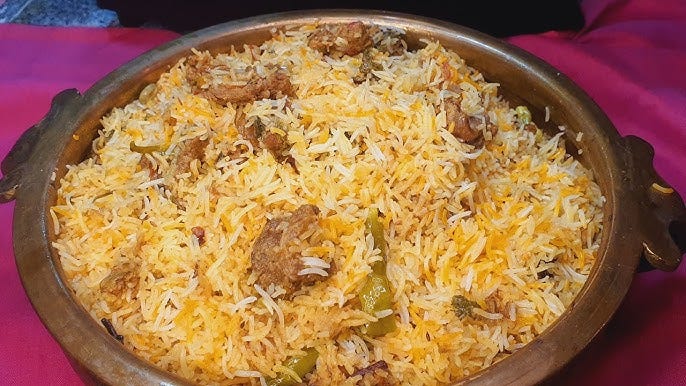Biryani, a culinary delight that holds a special place in the hearts and palates of Hyderabadis, stands out as a cost-effective source of protein within the city's diverse culinary landscape. Succulent pieces of meat intertwined with fragrant rice are readily available for an affordable price at an average restaurant. Yet, for those who consider this a steep price for a single meal, there exists an alternative known as the "other" biryani—the Kalyani biryani.
Found in humble hole-in-the-wall setups, the Kalyani biryani remains somewhat of a hidden gem, often overlooked by those outside Hyderabad. Distinct from its more renowned relative, the Hyderabadi dum biryani, the Kalyani biryani boasts an economical appeal, with half the price. What sets it apart is its main ingredient—it's not your typical chicken or mutton variety, but rather crafted from buffalo meat, colloquially referred to as 'buff biryani' at these establishments.
Prior research becomes imperative for those embarking on a quest for Kalyani biryani. Rarely advertised on the streets or included in the must-try lists for tourists, this biryani variety maintains a discreet existence. Inquiries about its name may lead to intriguing revelations, such as "Kalyani" being used as a code word for buffalo meat, subtly sidestepping the term 'beef'.
Often considered a dish associated with royalty due to its rich ingredients and flavors, biryani, in its various forms, caters to diverse tastes. Our culinary journey brings us to the Kalyani biryani, a more affordable yet equally satisfying version from the heart of Hyderabad. Despite its association with the Nawabs of Bidar, its humble origins are masked by the enticing blend of aromatic rice and protein.
Legend has it that the biryani's nomenclature stems from the Kalyani Nawabs who migrated from Bidar to Hyderabad in the 18th century. The Kalyani Nawab ki Deori (haveli) played a pivotal role in the creation of this unique biryani. Although the haveli was renowned for its hospitality, the government takeover of Hyderabad in 1948 under Operation Polo led to a loss of control by the Kalyani Nawabs.
With the Deori now facing financial constraints, the substitution of buffalo meat for chicken and mutton gave rise to the more affordable Kalyani biryani. Often misconstrued as beef biryani due to the buffalo meat, euphemisms like 'Kalyani' started being employed for beef-based dishes. Notably, it is crucial to differentiate between beef, which specifically refers to cow meat, and buffalo meat.
Today, inconspicuous eateries dotting the cityscape serve Kalyani biryani at an economical price. One of the most renowned establishments is the one founded by Dawood, a cook from the Nawabs of Kalyan era, named Original Kalyani Biryani, situated behind Charminar. Despite lacking the opulence of expensive spices and traditional proteins, these unassuming eateries have successfully preserved the legacy of Kalyani biryani in its birthplace, amidst the popularity of Hyderabadi dum biryani.




